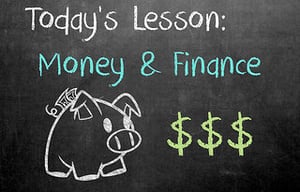
It’s never too early to start imparting wise money-ways to the next generation. Teaching children about money can be a challenge. When it comes to investing it can be even harder since we have been trained for years that our investments are private and fear of loss keeps us from sharing with those around us. Especially our children!
My kids love being a part of our real estate investing. They want to visit the houses and see the work done. They have no idea the behind the scenes, but there will be plenty of time for that later. As for now, I want to teach them to be positive and brave and to respect money and investments.
There are plenty of philosophies on how best to educate and responsibly teach kids about finance. Some earn money through chores. Some have a weekly or monthly allowance. Some pay a small fine for trespasses, from slipping with a swear to putting bugs in their older sister’s bed.
Even as real estate investors, teaching our children how to handle money responsibly isn’t easy. Money and finances can be complicated — but that doesn’t mean we can’t use our wisdom from investing in real estate to impart good principles for the future of their money management.
While these tips primarily target younger children, remember that you can always impart your financial wisdom, whether you’re talking to 12-year-olds and teenagers or your grown children.
4 Ways to Teach Your Kids About Finances
Start With Savings
After settling on an appropriate and reasonable allowance for your children, use it as a tool to teach them how to save. You can start by simply refusing to fulfill an immediate impulse when your child doesn’t have the funds to make a desired purchase. Make them wait until their next allowance. By the same token, teach them about setting money aside. They can start to learn when something is worth dipping into their savings for — and when it isn’t.
Make Buckets
U.S. News Money recommends a bucket method for kids. Require your children to split their allowance into four “buckets”: charity, savings, investing and spending money. Require that that allowance but used, in some way, in all four buckets. Talk through their financial decisions with them and stress the value of empathy and giving as much as the value in delayed gratification and the principles of compounding.
Learn Balancing and Budgets
From the buckets, children must learn the relationship between earning, spending and saving. Can they afford to dip into their savings for something? Is it worth the trade-off? In time, they can learn how to balance a checkbook and develop a personal budget. Teach them, then let them try out financial concepts in real life. In time, they will develop an appreciation for the value of money and how to wield their capital responsibly.
Invest!
It doesn’t have to be a big investment. Some children may not be ready for it, and looking at stocks and everything involved may be overwhelming to them. Introducing them to mutual funds and teaching them how to follow stocks, however, can be a valuable step to raising financially-savvy kids. You may just be bringing up the next great generation of real estate investors.
Let them try. Involve them. Even if the concepts are simplified for their sake, you can explain to them how investing works and how it can grow their money for the future. There’s plenty kids can learn from you about money. Don’t let them get to their senior year of high school before they take a Personal Finance class. Use what you know from investing in real estate to build a solid education for their future.
Instill good money sense early. In the end, it will pay off. Want to download an information packet about Memphis Invest and passively investing in real estate?
What was the most valuable piece of financial advice you received when you were young? Share with us in the comments.
image credit: www.gotcredit.com












